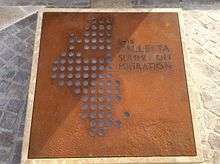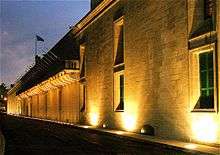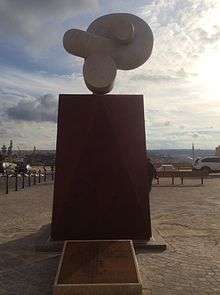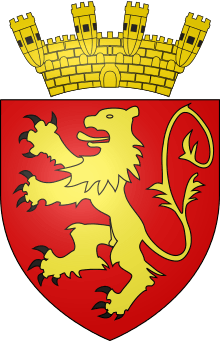Valletta Summit on Migration
The Valletta Summit on Migration, also called the Valletta Conference on Migration,[1] was a summit held in Valletta, Malta, on 11–12 November 2015, in which European and African leaders discussed the European migrant crisis. The summit resulted in the EU setting up an Emergency Trust Fund to promote development in Africa, in return for African countries to help out in the crisis.
| Valletta Summit on Migration Valletta Conference on Migration | |
|---|---|
 Logo of the Valletta Summit | |
| Host country | Malta |
| Date | 11–12 November 2015 |
| Venue(s) | Mediterranean Conference Centre |
| Cities | Valletta |
| Website | consilium.europa.eu |
| Key points | |
The summit was held at three venues in Valletta. The opening ceremony was held at Auberge de Castille, while the Mediterranean Conference Centre hosted the main conference. Fort Saint Elmo was used as a media centre. The summit was the largest one ever hosted in Malta,[2] with around 4,000 people attending. The summit was held a few weeks before the Commonwealth Heads of Government Meeting 2015, which was also held in Malta.[3]
Background

The European migrant crisis began when large numbers of migrants and refugees from various countries came to the European Union and applied for asylum. The term "crisis" has been widely used since April 2015, when a number of boats carrying migrants sank in the Mediterranean Sea, resulting in the deaths of around 1,200 people. Following the shipwreck of 19 April, the European Council held a meeting to discuss the situation of migrants in the Mediterranean Sea. Among the decisions made during this meeting, EU leaders agreed to increase dialogue with the African Union and other countries involved in the migrant crisis by holding a summit in Valletta, Malta.[1]
The summit was meant to include leaders of the countries of origin, transit or destination of the migrants. The heads of state and government of EU member states, the African Union Commission, the ECOWAS Commission, and states parties to the Khartoum and Rabat Processes were all invited to the summit, as were the Secretary-General of the United Nations and representatives from the International Organization for Migration.[1]
The summit

The Valletta Summit began with an opening ceremony in front of Auberge de Castille, the Office of the Prime Minister of Malta. A monument was unveiled for the occasion.[4] After the ceremony was over, the leaders were transferred to the Mediterranean Conference Centre.[5]
The summit itself began at 6:30 p.m. with a speech by Maltese Prime Minister Joseph Muscat. On the first day, the leaders discussed a situation in which African countries would help to reduce migration across the Mediterranean, with the EU giving Africans better access to Europe in return.[2] According to Muscat, the meeting was "less confrontational than expected".[6]
On 12 November, the European and African leaders signed an agreement to set up an Emergency Trust Fund to help development in African countries as well as to encourage those countries to take back migrants who arrived in Europe. The fund pledged €1.8 billion in aid, with other development assistance of €20 billion every year.[7] The leaders also pledged action to improve the situation in the Horn of Africa, the Sahel, Lake Chad and other parts of Africa to reduce the flow of refugees. They also promised to promote regular migration channels and implement policies for integrating migrants into society.[6]
The summit ended with a Final Declaration and an Action Plan. Donald Tusk, the President of the European Council, said that the migrant crisis was a "race against time" to save the Schengen Agreement.[7]
Aftermath
An informal summit of EU leaders was held just after the Valletta Summit ended. The key points discussed included the threat to the Schengen Area, securing Europe's external border and relations with Turkey.[8]
In July 2016, Minister for Home Affairs and National Security Carmelo Abela announced that the Maltese government is planning a follow-up meeting to the Valletta Summit.[9]
Participants
The leaders who took part in the Valletta Summit are listed in the table below. Sudan was represented by its foreign minister as President Omar al-Bashir could not travel to Malta due to an international arrest warrant. Poland was only represented by an undersecretary of state due to a clash with the first sitting of the country's new parliament.[10]
Monument

A monument commemorating the summit was erected in Valletta's Castille Square, which had just been refurbished. The monument is called The Knot, and it symbolizes unity between Europe and Africa, as well as Malta's geographic position between the two continents. The monument was designed by the artist Vince Briffa,[12] and was carved from Carrara marble.[13]
References
- "Valletta Conference on Migration (Malta, 11–12 November 2015) – Orientation debate" (PDF). statewatch.org. Council of the European Union. 30 June 2015. Retrieved 12 November 2015.
- Grech, Herman (11 November 2015). "Live commentary: Valletta Summit". Times of Malta. Retrieved 12 November 2015.
- Attard, Rachel (31 October 2015). "8,000 people, many heads of state participating in Valletta Summit on Migration and CHOGM". The Malta Independent. Archived from the original on 15 November 2015. Retrieved 12 November 2015.
- "Castille Square dazzles at the Valletta Summit opening ceremony". Bay Network. 11 November 2015. Retrieved 12 November 2015.
- Sansone, Kurt (11 November 2015). "Valletta Summit: EU-Africa leaders meet amid differences". Times of Malta. Retrieved 12 November 2015.
- Grech, Herman (12 November 2015). "Live commentary: Valletta summit – the final day". Times of Malta. Retrieved 12 November 2015.
- "Migration summit: "We are in a race against time to save Schengen" – Tusk". Times of Malta. 12 November 2015. Retrieved 12 November 2015.
- "EU informal summit closes: 'We need to regain control of the external border as a precondition for European migration policy -Tusk". Times of Malta. 12 November 2015. Retrieved 12 November 2015.
- "Malta wants a Valletta Summit follow-up meeting". Times of Malta. 19 July 2016. Retrieved 19 July 2016.
- Ganado, Philip Leone. "Poland missing from summit". Times of Malta. Retrieved 16 November 2015.
- "Participants". consilium.europa.eu. Retrieved 16 November 2015.
- "New monument for Castille Square". Times of Malta. 25 October 2015. Retrieved 12 November 2015.
- "New monument in Castille Square to mark upcoming Valletta Summit for Migration". The Malta Independent. 25 October 2015. Retrieved 12 November 2015.
